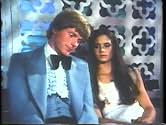Aggiungi una trama nella tua linguaA made-for-TV movie based on Judy Blume's 1975 novel "Forever...".A made-for-TV movie based on Judy Blume's 1975 novel "Forever...".A made-for-TV movie based on Judy Blume's 1975 novel "Forever...".
Foto
Woodrow Chambliss
- Grandfather
- (as Woody Chambliss)
Trama
Lo sapevi?
- ConnessioniReferenced in Alien Tales (1995)
- Colonne sonoreI Love How You Love Me
by The Paris Sisters
Recensione in evidenza
It's hard to explain why, but this coming-of-age story struck me as highly appealing. Some say that it pales in comparison to Judy Blume's novel; since I haven't read the novel, I wouldn't know. It's a simple story: Fresh-faced Kath (Stephanie Zimbalist) has her sexual awakening with the local blonde hunk, only to find that life is slightly more complicated than One Perfect Love, Forever. And that's okay.
When I tuned in, Dean Butler was sweeping Kath off her feet to the tune of "Cherchez La Femme." How many times do you hear Dr. Buzzard's Original Savannah Band on the soundtrack of a movie, let alone a TV-movie? I was locked in place with fascination. Why? Because this movie exemplifies the look and feel of the 1970s in every frame. Shots of the kids playing Pong and doing the Hustle are presented without self-consciousness, not as condescending self-reference, but simply as teenage behavior. The '70s hold a strong appeal for me--the clothes, the music, etc. Forever was made before the world became the uptight, shrill, boring, ugly place it is now. Seeing as I was born in 1983, these feelings might be carry-over from a previous existence. At any rate...
The acting is thoroughly convincing. Zimbalist is likable, but the best turns come from Beth Raines (as her Janis Ian-style best friend) and John Friedrich (as a repressed would-be thespian); also noteworthy is a pre-Mommie Dearest Diana Scarwid as wild girl Sybil. I like the presentation of sex (and sexual responsibility) in a positive light, without any heavy-handed "moral" crap. Nowadays, no TV movie would dare present sex between young people from such a perspective. More's the pity. The wonderful less-than-slick, quasi-verite photography and dialogue are also something you're not gonna see again any time soon. Same for realistic-looking actors who don't resemble surgical freaks or Gap rejects.
Granted, there are moments that will trigger the why-the-hell-am-I-watching-this response in some individuals. For example, when the young couple hike through the mountains as Jennifer Warnes delivers "Right Time of the Night" on the soundtrack, you half-expect to see a frosty bottle of beer superimposed over the action. At some moments, the material seems to have been altered for television, with censor-friendly terms uncomfortably wedged in in place of swearing. There are times when the movie is downright awkward in its sincerity ("I wet my dress," murmurs Kath after setting off a burglar alarm). But the whole story is about being awkward and confused; many would say that adolescence is about being awkward and confused. And you learn from it. And we are left with the EMI logo and the gravel-throated voice of Stevie Nicks.
When I tuned in, Dean Butler was sweeping Kath off her feet to the tune of "Cherchez La Femme." How many times do you hear Dr. Buzzard's Original Savannah Band on the soundtrack of a movie, let alone a TV-movie? I was locked in place with fascination. Why? Because this movie exemplifies the look and feel of the 1970s in every frame. Shots of the kids playing Pong and doing the Hustle are presented without self-consciousness, not as condescending self-reference, but simply as teenage behavior. The '70s hold a strong appeal for me--the clothes, the music, etc. Forever was made before the world became the uptight, shrill, boring, ugly place it is now. Seeing as I was born in 1983, these feelings might be carry-over from a previous existence. At any rate...
The acting is thoroughly convincing. Zimbalist is likable, but the best turns come from Beth Raines (as her Janis Ian-style best friend) and John Friedrich (as a repressed would-be thespian); also noteworthy is a pre-Mommie Dearest Diana Scarwid as wild girl Sybil. I like the presentation of sex (and sexual responsibility) in a positive light, without any heavy-handed "moral" crap. Nowadays, no TV movie would dare present sex between young people from such a perspective. More's the pity. The wonderful less-than-slick, quasi-verite photography and dialogue are also something you're not gonna see again any time soon. Same for realistic-looking actors who don't resemble surgical freaks or Gap rejects.
Granted, there are moments that will trigger the why-the-hell-am-I-watching-this response in some individuals. For example, when the young couple hike through the mountains as Jennifer Warnes delivers "Right Time of the Night" on the soundtrack, you half-expect to see a frosty bottle of beer superimposed over the action. At some moments, the material seems to have been altered for television, with censor-friendly terms uncomfortably wedged in in place of swearing. There are times when the movie is downright awkward in its sincerity ("I wet my dress," murmurs Kath after setting off a burglar alarm). But the whole story is about being awkward and confused; many would say that adolescence is about being awkward and confused. And you learn from it. And we are left with the EMI logo and the gravel-throated voice of Stevie Nicks.
I più visti
Accedi per valutare e creare un elenco di titoli salvati per ottenere consigli personalizzati
Dettagli
Contribuisci a questa pagina
Suggerisci una modifica o aggiungi i contenuti mancanti






















